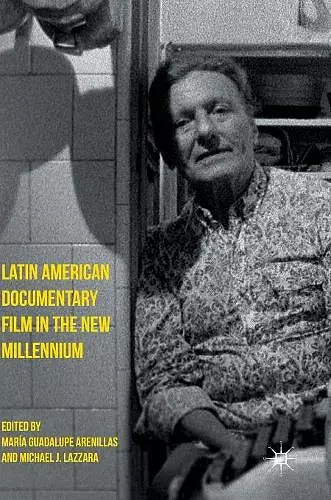Latin American Documentary Film in the New Millennium
Michael J Lazzara editor María Guadalupe Arenillas editor
Format:Hardback
Publisher:Palgrave Macmillan
Published:8th Jul '16
Currently unavailable, and unfortunately no date known when it will be back

"Arenillas and Lazzara's book traces a commendable and up-to-date cartography of Latin American documentary film's regional, thematic, and stylistic variations, placing these in dialogue with their respective sociocultural and political contexts. A key reference work, this volume not only explores how documentary film engages the challenges of our times-legacies of dictatorship; obstinate memories; social, ethnic, and cultural conflicts; or struggles for identity and rights-but also how it does so in ways that are artistically experimental and that once again point to the complex interfacing of aesthetics, ethics, and politics." (Leonor Arfuch, University of Buenos Aires and author of "El espacio biografico: dilemas de la subjetividad contemporanea") "Latin American documentary filmmaking is mostly know to international audiences as a politically-committed and ideologically charged cinema that references the major sociohistorical processes of the twentieth century: the Mexican Revolution, the Cuban Revolution, dictatorships, and uprisings for social justice. In the new millennium, however, tightly-controlled and often vast-scaled projects have given way to a subjective turn in which subaltern subjects speak in their own voices, the pretense of master narratives disappears, and experimentalism reigns. Arenillas and Lazzara's sophisticated and theoretically-grounded book draws out the rich textures and human experiences captured in these films." (David William Foster, Arizona State University and author of "Latin American Documentary Filmmaking: Major Works")
Nearly two decades into the new millennium, Latin American documentary film is experiencing renewed vibrancy and visibility on the global stage. This book highlights the richness and heterogeneity of Latin American documentary film, surveys a broad range of national contexts, styles, and practices, and expands current debates on the genre.
Nearly two decades into the new millennium, Latin American documentary film is experiencing renewed vibrancy and visibility on the global stage. While elements of the combative, politicized cinema of the 1960s and 1970s remain, the region’s production has become increasingly subjective, reflexive, and experimental, though perhaps no less political. At the same time, Latin American filmmakers both respond to and shape global tendencies in the genre. This book highlights the richness and heterogeneity of Latin American documentary film, surveys a broad range of national contexts, styles, and practices, and expands current debates on the genre. Thematic sections address the “subjective turn” of the 1990s and 2000s and the move beyond it; the ethics of the encounter between the filmmaker and the subject/object of his or her gaze; and the performance of truth and memory, a particularly urgent topic as Latin American countries have transitioned from dictatorship to democracy.
ISBN: 9781137495228
Dimensions: unknown
Weight: 5157g
302 pages
1st ed. 2016